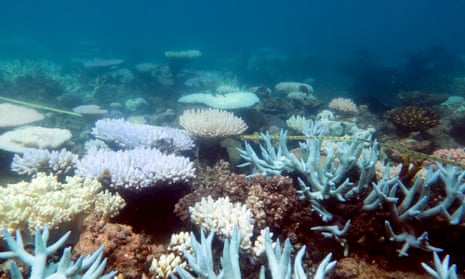Climate action is way off course in all but one of the world’s 20 biggest economies, according to a report that shows politicians are paying more heed to the fossil fuel industry than to advice from scientists.
Among the G20 nations 15 reported a rise in emissions last year, according to the most comprehensive stock-take to date of progress towards the goals of the Paris climate agreement.
The paper, by the global partnership Climate Transparency, found 82% of energy in these countries still being provided by coal, oil and gas, a factor which has relied on an increase of about 50% in subsidies over the past 10 years to compete with increasingly cheap wind, solar and other renewable energy sources.
The G20 nations spent $147bn (£114bn) on subsidies in 2016, although they pledged to phase them out more than 10 years ago.
Governments have said they will change, but on current commitments the world is on course for a 3.2C rise in average global temperatures, more than double the lower Paris threshold of 1.5C, which scientists have said represents the last chance to save coral reefs, the Arctic ecosystem and the wellbeing of hundreds of millions of people at risk of increased drought, flooding and forest fires.
“The gap is still very big,” said Jan Burck, one of the authors of the report. “The G20 is not moving fast enough.”
Comparing the goals and policies of different countries, the paper found that only India was on course to stay below the upper limit set by the Paris agreement of 2C, while the worst offenders – Russia, Saudi Arabia and Turkey – would take the world beyond 4C.
China, the world’s biggest emitter, stabilised its releases of carbon for a couple of years by reducing dependency on coal, but this positive trend slipped last year. Indonesia, Brazil and Argentina have promised to cut deforestation but the destruction rate of forests shows no sign of reversing.
Britain has made the fastest transition, with a 7.7% decline in the use of fossil fuels between 2012 and 2015, but the report warned that this could stall in the years ahead because the government had cut support for feed-in tariffs, energy efficiency and zero-carbon homes.
The authors said political pressures in the G20 countries, with more subsidies for fossil fuels, were working against effective climate action.
“There is a huge fight by the fossil fuel industry against cheap renewables. The old economy is well organised and they have put huge lobbying pressure on governments to spend tax money to subsidise the old world,” Burck said.
These political pressures are likely to intensify as governments are called upon to extend emissions cuts to the transport and agriculture sectors. The report said G20 emissions needed to start declining in the next two years and halve by 2030 if the world were to avoid more than 1.5C of warming, though not one country in the group had set a credible target to do this.
The UN climate talks in Katowice, Poland, in December –the COP24 conference – will start a two-year process for governments to deliver on their commitments to reduce emissions. Although there are national leaders hostile to tackling climate change, such as in the US and Brazil, there is still hope they will be open to taking their share of the responsibility.
Christiana Figueres, former executive secretary of the UN framework convention on climate change, said: “Global emissions need to peak in 2020. The Brown-to-Green report provides us with an independent stock-take on where we stand now. This is valuable information for countries when they declare their contribution in 2020.”
